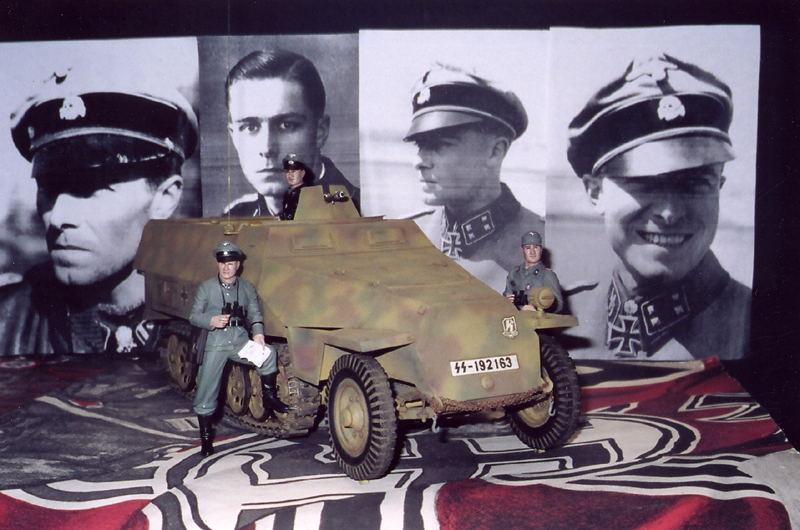
SS STANDARTENFUHRER JOCHEN PEIPER. Panzer Regiment Commander Jochen Peiper was an officer that possessed most of the qualities that distinguished the “Great captains of history”. A blend of acute observation with swift-sure intuition; the ability to create surprise and throw the opponent off balance; the speed of thought and action that allows the opponent no chance of recovery; the combination of strategic and tactical sense; the power to win the devotion of troops and get the utmost out of them. Jochen Peiper had another of the great classic qualities: a sense of what is possible. Jochen Peiper had the amazing knack of making “the impossible” possible. Beyond these qualities Jochen Peiper had creative imagination, the basic characteristic of genius in the military sphere as well as in others. Most of the recognized masters of the art of war have been content to use the familiar tools and techniques of their time. Only a few set out to provide themselves with new means and methods. Development in tactics have usually been due to some original military thinker and his gradually spreading influence on progressive-minded officers of the rising generation. Innovators have rarely had the chance to put into practice themselves the theories they have expounded. Jochen Peiper, however, was able to gain that opportunity. And as he coupled creative imagination with dynamic energy he as able to exploit the opportunity---with revolutionary results, of which he was both the exponent and executant. On the battlefields of the specialist mind and how it works, he had far more imagination than most specialists, and it was exercised almost entirely within the bounds of his professional subject, and burning enthusiasm increased the intensity of his concentration. Jochen Peiper was a single-minded soldier, professional in the truest sense, the quintessence of the craftsman in the way he devoted to the progress of a technique and capable of understanding the passion of pure craftsmanship. Jochen Peiper acquired almost magical properties in the mind of his soldiers. A commander does not gain a reputation of his sort unless he is out of the ordinary and Peiper was certainly exceptional. Germany produced many efficient commanders, Jochen Peiper stood out amongst them because he had overcome the innate rigidity of the German military mind and was a master of improvisation. Peiper remained pre-eminent as a leader on the battlefield and testified to his resilience, resourcefulness, and mental agility to his accounts for his amazing---and it was amazing---success as a leader of men in battle. Jochen Peiper gave the allies and the soviets many anxious moments, his battalion would mature into the elite corps that would make all of Europe tremble. For if ever there was a commander whose sole preoccupation was the destruction of the enemy, it was he. His battalion showed no mercy and expected none. Jochen Peiper was a hard-boiled bravo in an uninterrupted series of armored triumphs. Peiper’s battalion, at whatever mission, always threw the allies and the soviets into disarray as they charged around dispensing confusion, death and destruction, demonstrating both strategic and tactical cunning, which always resulted with a great measure of success, he was the man of the hour. Over fifteen million men saw service in the Wehrmacht from 1939-1945, yet only slightly more than 7,000 men were singled out to receive Germany’s highest award for valor: The Knight’s Cross of the Iron Cross. The common denominator is bravery, bravery in the heat of battle; bravery in the face of sure death; bravery in spite of overwhelming odds in favor of the opposition; bravery that contradicts even one’s own personal character. The soldier who takes the field of combat determined to commit an act of bravery will invariably find death as his reward. The German serviceman, and in particular the Knight’s Cross bearer, is unique since he must commit repeated acts of bravery to achieve this exalted distinction. In most major armies of the world, a soldier can earn his nation’s highest award with a single act of valor deemed worthy of the award. However, to have earned the Knight’s Cross, a combatant must have demonstrated at least three, possibly more, significant acts of valor. More were required to receive the higher awards of the Knight’s Cross (the Oak leaves, the Swords, and the coveted Diamonds). Jochen Peiper was always faced with a situation, and responded with an act of bravery, far beyond that normally expected of a soldier, and was a worthy winner of Germany’s highest gallantry awards. The Knight’s Cross at his throat attested to his qualities and skill. The Knight’s Cross was the embodiment of the act of valor, and the very symbol of the German nation. The award served to recognize the brave combatant, and serve as an inspiration to his comrades in arms in the good sense of Germanic greatness.